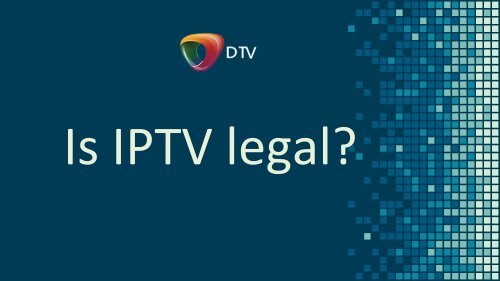
The rise of IPTV (Internet Protocol Television) has revolutionized the way we consume entertainment, offering convenience, affordability, and flexibility. However, with its growing popularity comes an important question: Is IPTV legal? The answer is not as straightforward as it might seem, and it largely depends on how IPTV services are provided and used. In this article, we’ll dive deep into the legal landscape of IPTV, helping you understand the risks, benefits, and how to stay on the right side of the law.
What Is IPTV?
IPTV is a technology that delivers television content over the internet rather than through traditional satellite or cable systems. It allows users to stream live TV, on-demand shows, and movies using their internet connection. Popular IPTV services offer features like multi-device compatibility, customizable viewing options, and access to international channels.
Is IPTV Legal?
The legality of IPTV depends on several factors:
1. Licensed Content
IPTV services that provide properly licensed content from legitimate sources are completely legal. These services enter into agreements with content creators, broadcasters, or distributors to stream their media. Examples include popular platforms like Hulu, YouTube TV, and Amazon Prime Video.
2. Unauthorized Streaming
IPTV services that offer unauthorized or pirated content are illegal. These platforms often provide access to copyrighted movies, sports, and TV shows without permission from the rights holders. Using such services can have legal consequences for both the provider and the user.
“Learn more about IPTV legality from WIPO’s Copyright Guidelines
“”For details on UK laws, check GOV.UK’s copyright information
WIPO’s Copyright Guidelines“Explore What Is IPTV for a comprehensive understanding.
Check out Best IPTV Providers to make informed choices.”
How to Identify Legal IPTV Services
If you’re wondering “Is IPTV legal for me to use?”, here are some tips to ensure you’re choosing a legitimate service:
1. Check for Licensing Information
Reputable IPTV providers clearly state their licensing agreements. Look for this information on their website or in their terms and conditions.
2. Avoid “Too Good to Be True” Deals
If an IPTV service offers hundreds of premium channels for an unbelievably low price, it’s a red flag. Legal services have to pay licensing fees, so their pricing reflects these costs.
3. Research the Provider
Read reviews and verify the provider’s reputation. Trusted providers are often reviewed by credible tech websites or forums.
4. Verify Payment Methods
Legal IPTV services typically use mainstream payment methods like credit cards or PayPal. Be cautious of providers asking for cryptocurrency payments, as they may be attempting to avoid tracking.
Legal Consequences of Using Illegal IPTV
Using illegal IPTV services comes with risks, including:
1. Fines and Penalties
In many countries, accessing pirated content is a violation of copyright laws. Authorities can impose hefty fines on users caught streaming illegal IPTV.
2. Data Privacy Risks
Illegal IPTV services often lack security measures, putting your personal information at risk. Hackers can exploit these services to steal sensitive data.
3. Poor Streaming Quality
Illegal providers don’t invest in infrastructure, so users often experience buffering, poor-quality streams, or sudden service interruptions.
4. Legal Action Against Providers
Governments around the world are cracking down on illegal IPTV providers. Users may also be implicated if records show they accessed pirated content.
Country-Specific Laws About IPTV
The legality of IPTV also depends on where you are located. Here’s a quick overview of how different countries handle IPTV:
1. United States
IPTV is legal in the U.S. as long as the service operates with proper licensing. However, strict copyright laws mean users can face legal action if they knowingly access pirated streams.
2. United Kingdom
The UK has robust anti-piracy laws. Users and providers of illegal IPTV services can face prosecution under the Digital Economy Act.
3. European Union
Most EU countries have stringent copyright protections. Authorities actively monitor illegal IPTV services and prosecute offenders.
4. Other Countries
Regulations vary widely. Some regions have lax enforcement, while others impose strict penalties for IPTV piracy. Always check local laws before subscribing to an IPTV service.
How to Use IPTV Legally
To enjoy IPTV without legal concerns, follow these best practices:
1. Choose Reputable Providers
Stick to well-known IPTV providers that offer legal streaming options. Examples include Netflix, Disney+, and Sling TV.
2. Avoid Free or Unauthorized Services
Free IPTV services often rely on pirated content. If a service seems suspicious, it’s best to avoid it.
3. Understand Your Rights
Research the copyright laws in your country to ensure you’re not violating any regulations when using IPTV.
Legal vs. Illegal IPTV: Key Differences
| Feature | Legal IPTV | Illegal IPTV |
|---|---|---|
| Content Licensing | Properly licensed | Unlicensed or pirated |
| Service Reliability | High-quality, reliable streams | Unreliable and prone to outages |
| Payment Methods | Secure and mainstream options | Risky or anonymous payments |
| Legal Risks | None | Fines, penalties, or prosecution |
Future of IPTV: Will Regulations Tighten?
As IPTV continues to grow in popularity, governments and regulatory bodies are likely to impose stricter rules to combat piracy. Advances in technology may also make it easier to track illegal streaming activities. This means users must be cautious and choose legal IPTV providers to avoid future complications.
Conclusion: Is IPTV Legal?
The legality of IPTV boils down to whether the service is authorized to stream the content it provides. While legal IPTV services are a convenient and legitimate way to access entertainment, illegal services come with significant risks, including legal penalties and data privacy concerns.
By choosing licensed IPTV providers and staying informed about local laws, you can enjoy the benefits of IPTV without any worries. Remember, if you’re ever in doubt about “Is IPTV legal?”, do your research and opt for providers that operate transparently.
